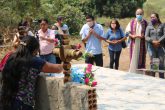Newsletter 900 – Four children die from outbreak of diarrhea in Maxakali communities
Occurrences began in January and resulted in 94 children being admitted to hospitals in the region
Since the beginning of January, 94 cases of acute diarrhea were recorded in communities of the Maxakali people, in Minas Gerais. Children of up to five years of age from the villages of Pradinho and Água Boa, located in the municipality of Bertópolis, in the northeastern part of the state, were hospitalized in regional hospitals. Four of the children died.
It is suspected that the outbreak of diarrhea had been caused by ingestion of contaminated water, a situation that had already occurred three years ago without answers. At the time, the National Health Foundation (FUNASA) had already accompanied the Maxakali people and in fact, done nothing concrete to discover the cause of the outbreak.
Stranger yet is the fact that the highest incidence of cases occurred precisely in the village of Pradinho, held as a model village where a good portion of the FUNASA, FUNAI and Bertópolis municipal assistance is concentrated. The negligence of the National Health Foundation in treating the issue in a preventive and forthcoming manner could have been an aggravating factor.
For eight days the residents of the village were obliged to draw water from the river, knowing it was not fit for consumption, as the pump for an artesian well had broken. The FUNASA response to requests from the community to repair or replace the pump took longer than they could wait.
According to Adalberto Maxakali, of Pradinho, the presence of FUNASA in the area is sporadic, which does not allow an effective and efficient service. As a result of this, at various times, residents neighboring the community have provided emergency relief to those in need of medical attention. According Adalberto, not even the ambulance that was designated for Maxakali service came to the region.
Several problems are pointed out by the leaders during the treatment of the infected children, which to them is related to lack of training of the functionaries of the Foundation. Many women and families accompanying the hospitalized children, in the CASAI (Casa de Saúde Indígena) received inadequate treatment. Some even being pushed by security guards or seeing the children left on hospital stretchers.
Another factor that may have contributed to the outbreak of diarrhea is the way in which soup provided by Funasa is served. According to leaders of the village Cachoeirinha, it is served in a large vat, which is placed on the ground for people to serve using plastic bottles cut in half. It is worth emphasizing that the food arrives cold and found to be of disagreeable aspect to the villages, as it is produced in locations far from of the community.
Current situation
According to a statement released by the National Health Foundation (FUNASA), last Tuesday (09), the situation is under control, with only one verified hospital admission and found medical discharge of 12 of the 36 children admitted to five hospitals in the region.
The agency also reported that steps were taken to stop the outbreak, medicines and food parcels were sent to the affected communities, as well as a task force that aims to assess the occurrence of new cases and educating the public. Medical staff of the Department of Indigenous Health (Desai) are also conducting investigations to discover the cause of the outbreak and monitoring the cases on record.
Added by: Administrator






